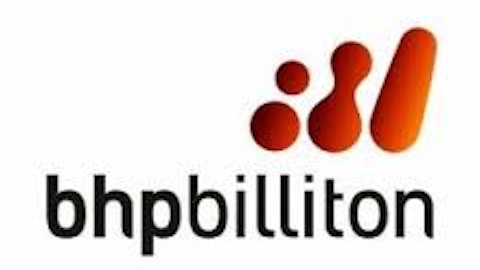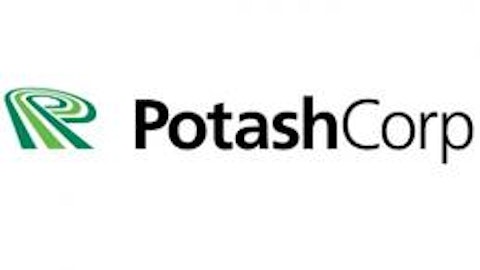With demand for food grains increasing, global demand for fertilizer is expected to increase at a CAGR 10.6% from $134 billion in 2010 to $223 billion in 2015. To monetize this opportunity, agrochemical companies are expanding their production capacity.
Here are three agrochemical companies with expansion plans that might create opportunities for investors.
Acquisition for further expansion
Agrium Inc. (USA) (NYSE:AGU) currently operates 1,200 retail centers across the world, including 65 locations in Canada. The company currently has little presence in Canada–in order to expand its reach, Agrium is planning to acquire 90% of Viterra’s Canadian retail business. The deal will close after the second half of 2013, and will add 232 retail centers in Western Canada to Agrium’s assets.
This acquisition will have an EBITDA impact of $1.2 billion in 2014 on Agrium Inc. (USA) (NYSE:AGU)’s retail segment, rising from $1 billion in 2013. The company has a target of $1.3 billion EBITDA in 2015. As a result, Agrium’s retail segment is expected to generate revenue of $12.6 billion this year, up from $11.4 billion last year.

Credit: Agrium Inc. (USA) (NYSE:AGU)
Analyzing the demand stemming from the U.S., the situation looks rosy from a short-term perspective. Due to the drought situations in this region, which destroyed the majority of agricultural produce, the demand for fertilizers is expected to rise in the upcoming quarters. This will add incremental sales of $205 million in this quarter. However, from a long-term perspective, sales are likely to remain flat.
Cost synergies from expansion
CF Industries Holdings, Inc. (NYSE:CF) imports approximately 9 million tons of nitrogen fertilizer to keep up with demand. The company is the largest manufacturer of nitrogen in North America. To reduce its reliance on imports, the company is planning to expand the production of nitrogen fertilizer by 1.2 million tons in 2015 and 4.5 million tons by 2016 in North America.
The cost of nitrogen fertilizer is largely dependent upon natural-gas prices, which are currently low in North America. Demand for nitrogen fertilizer is growing at an annual rate of 2% globally. By increasing production, CF Industries Holdings, Inc. (NYSE:CF) will save approximately $190 per ton and will reduce imports by approximately 40% per year.
Ammonia is the main component of phosphate fertilizer, and its prices are rising. The situation is leading toward greater costs for phosphate production and lower profits for the company. Furthermore, the U.S. is delaying its plantation program due to seasonal changes, which will lead to less demand for phosphate fertilizer, and thus declining sales. Gross profits from phosphate fertilizer will decline to $172 million this year from $198 million last year, and phosphate sales volume will decline by $15 million by the end of 2013, followed by $100 million by the end of 2014.
Expansion plan for self-sufficiency
Mosaic Co (NYSE:MOS) is the largest producer of potash in the world. Global demand for potash fertilizer is expected to grow at CAGR of 3.2%. To meet this demand, the company is planning to expand its potash fertilizer production in Canada by 2 million tons in the first half of 2014. Canada is rich in potash deposits, but Western Canada is facing high potash prices due to a lack of potash suppliers. Therefore, Mosaic Co (NYSE:MOS)’s expansion in Canada will help the company increase its total potash sales. Eventually, it will increase its potash sales to $3.6 billion in 2014 from $3.3 billion last year.
The company requires 1.5 billion tons of ammonia every year. Its production capacity fulfills only one-third of its requirement with a cost of $200 per ton. The rest of the ammonia is imported at $600 per ton, which is very expensive compared to in-house production. To cover the import cost, the company is planning to design a $700 million plant at its existing Faustina site. Plant construction will start in the first half of 2014 and will fulfill 100% of its ammonia requirements. Through this, Mosaic Co (NYSE:MOS) will save $400 per ton on ammonia.
Conclusion
Agrium Inc. (USA) (NYSE:AGU) is expanding its retail business by acquiring Viterra to achieve greater profitability. However, its potash business will face problems in the coming quarters.
CF Industries is expanding its nitrogen plant for future growth, but due to rising ammonia prices, its phosphate profit margins are declining.
Thus, these stocks are both rated “hold.”
Mosaic Co (NYSE:MOS) is expanding its potash plants in Canada and building an ammonia plant on its existing site. This expansion move will make the company self-sufficient and will bring cost synergies. This stock is a “buy.” Shweta is a member of The Motley Fool Blog Network — entries represent the personal opinion of the blogger and are not formally edited.
Shweta Dubey has no position in any stocks mentioned. The Motley Fool owns shares of CF Industries Holdings, Inc. (NYSE:CF).
The article 3 Agrochemical Companies Looking to Capitalize on Booming Fertilizer Demand originally appeared on Fool.com and is written by Shweta Dubey.
Copyright © 1995 – 2013 The Motley Fool, LLC. All rights reserved. The Motley Fool has a disclosure policy.





